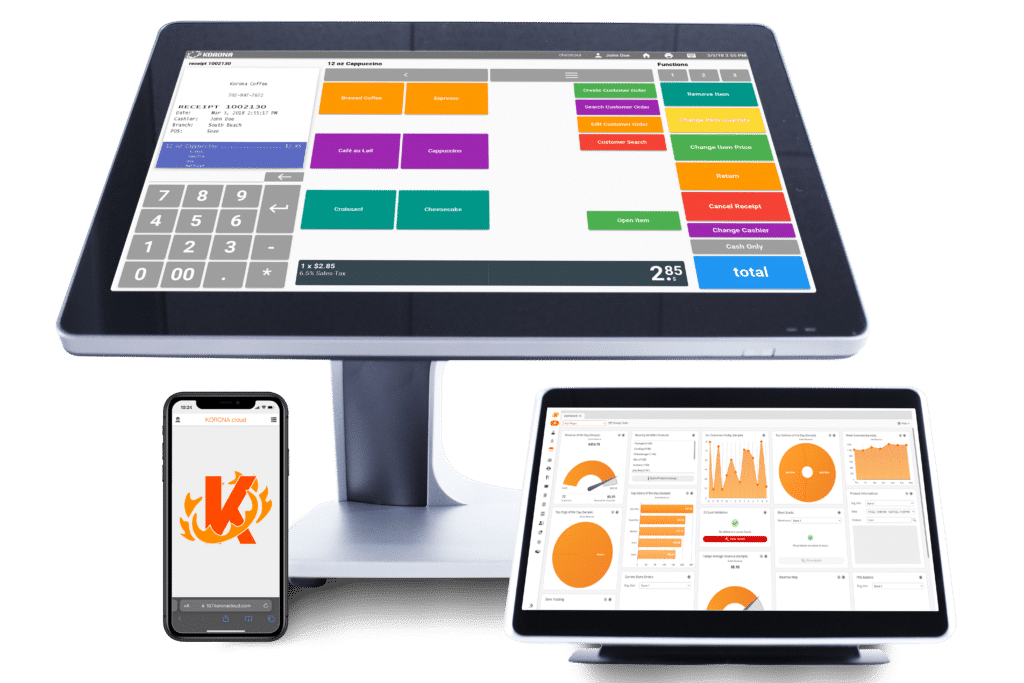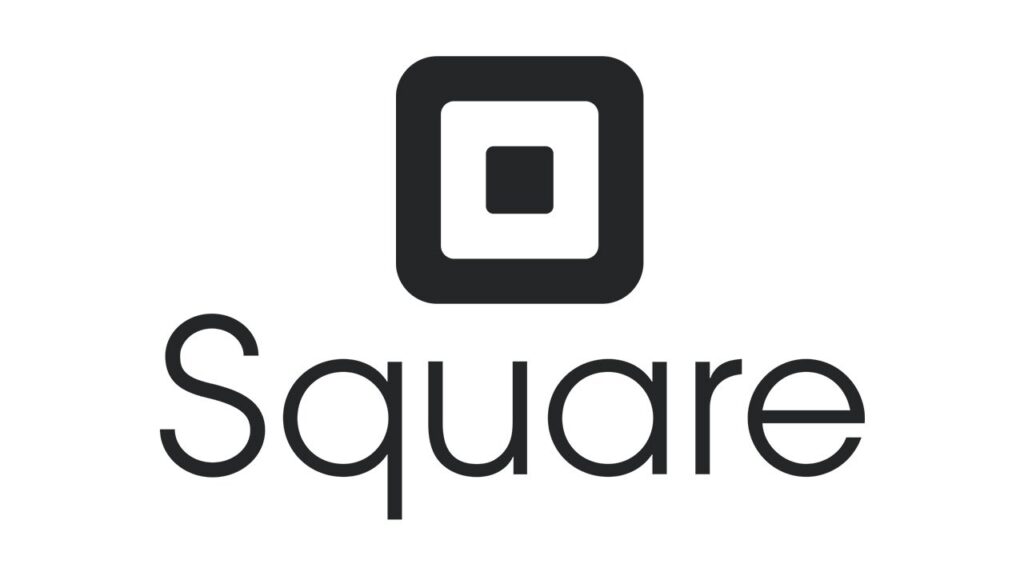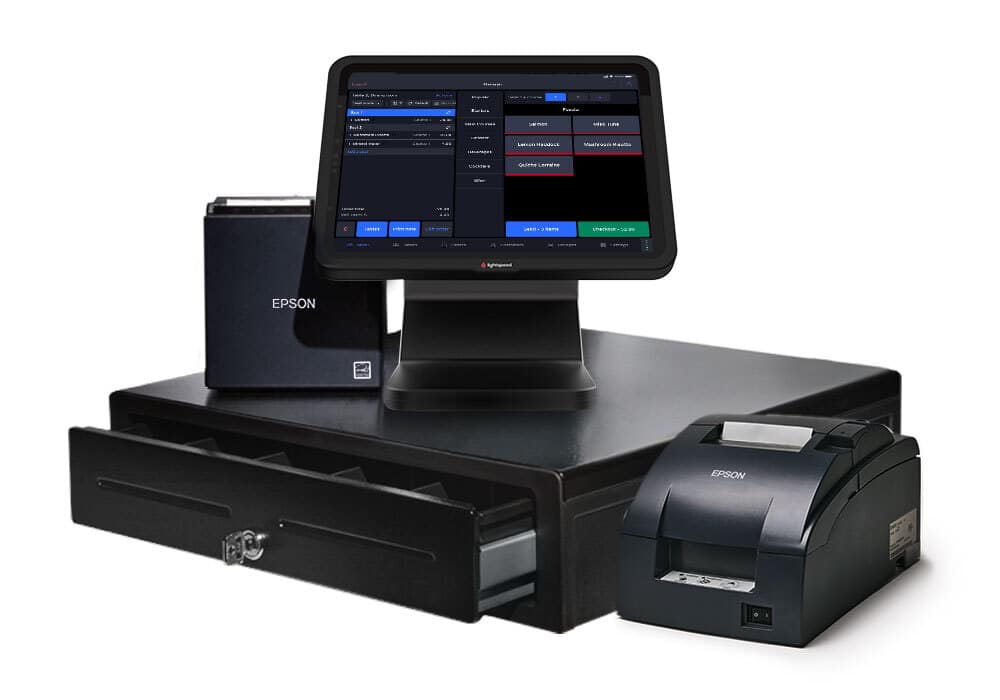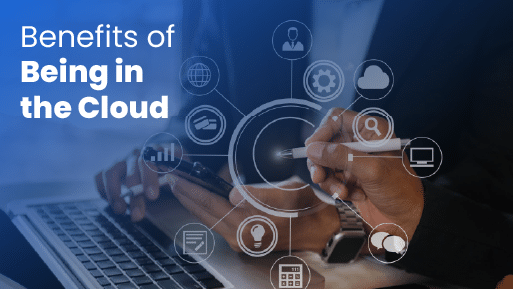Looking to centralize all of your data and operations in one neat, organized place? Then modern cloud-based point of sale is the answer.
This article zeroes in on the best cloud-based POS solutions, cutting through the clutter to deliver exactly what you need. With a focus on functionality, ease of use, and scalability, we’ve curated a list that promises to solve your POS woes. Get ready to discover the ideal solution that will revolutionize your business operations. Let’s dive in.
BEST Cloud-Based POINT OF SALE – A QUICK LOOK:
- KORONA POS: Best cloud-based POS for inventory management.
- Square POS: Best cloud-based POS for user-friendly interface.
- Shopify POS: Best cloud-based POS for eCommerce integration.
- Lightspeed: Best cloud-based POS for restaurant.
KORONA POS: Best Cloud-Based POS for Advanced Inventory

KORONA POS overview
Cloud-based point of sale streamlines inventory management by providing real-time updates and accessibility from any location, enabling businesses to monitor stock levels remotely.
These systems automate inventory tracking, reducing the likelihood of errors and minimizing manual input

Pros
- In-depth reporting
- Integration options
- Great scalability
Cons
- Not for full restaurant service
- Doesn’t support clothing stores
KORONA POS Pricing
Core
$59/mo
Retail
$69/mo
Enterprise
Custom
KORONA POS is a retail technology solution developed by COMBASE USA, the American subsidiary of COMBASE AG in Germany. COMBASE USA was founded in 2011 and has its headquarters in Las Vegas.
KORONA POS serves many verticals such as liquor, CBD, convenience, tobacco, books, and more. The company also provides platforms for wineries, amusement parks, quick service restaurants, multi-store franchises, and ticketed events.
Key Features
- Ensure that you keep an optimal stock level for each item.
- Integrate with other business applications, facilitating seamless data flow between inventory, sales, and financial records.
- Running out of stock leads to sales loss, while being overstocked ties up your cash.
- Access and control inventory from anywhere with a remote app
- Cloud facilitates easy data and product transfer between stores
Pros
- In-Depth Data and Reporting
Like your inventory, cloud POS software can forecast data and analyze trends in real-time. Reports focusing on best/worst sellers, day-to-day sales patterns, sales per transaction, inventory values, and many others are readily available with a cloud-based system.
- Integration with Other Business Management Tools
Under the cloud, KORONA POS manage email marketing, loyalty programs, and other forms of customer relationship management (CRM). Combining any or all of your CRM into one platform saves you time and money and ensures consistency and ease of communication with each customer.
- Improve Your Scalability
If you’re a multi-location store owner, you’ll have a ton of data to manage, which can be complicated to track if you have various types of POS software. KORONA POS system is designed to be scalable. There is no need to invest in expensive, cumbersome servers for each location.
Cons
- Not Ideal for Restaurant Service
First and foremost, KORONA POS is tailored for a retail POS solution. While the platform does offer great cloud-based solutions for QSRs and coffee shops, full scale hospitality with table service isn’t quite their bread and butter.
- Doesn’t Support Apparel Retailers
KORONA POS is focused on optimizing the verticals it does support. Apparel is not one of these. The system is not equipped to handle sizing information, making it ill-suited for the clothing vertical. Similarly, there are better POS options for jewelry stores.
Price
KORONA POS offers a straightforward and transparent pricing structure. Below is a look at different aspects of the service and pricing tiers.
Hardware:
KORONA POS is compatible with most devices. Retailers can keep their current POS hardware or choose from KORONA POS’s many hardware options.
Credit Card Processing:
KORONA POS does not charge credit card transaction fees. The platform is credit card agnostic, meaning retailers can choose any processor they wish.
No Extra Fees:
KORONA POS pricing is entirely transparent. No long-term contracts, surcharges, signup, cancellation, or hidden fees are required. All costs are included in the monthly subscriptions, which include 24/7 in-house customer service.
Subscription Tiers:
KORONA POS has three main pricing options for monthly subscription plans: Core, Retail, and Add-Ons.
Retailers paying for yearly subscriptions upfront will receive a discount of one free month.
- Core Plan: $59 per month
The Core plan includes all of the essentials for operating a retail store. It comes with reporting and analytics tools to gain sales data insights. The number of POS login profiles is unlimited, and the dashboard is fully customizable to cater to your workflow.
This option also includes eCommerce integration and a native gift card program.
- Retail Plan: $69 per month
The Retail plan is a more robust option. The package has an advanced customer relationship management platform to help companies excel with targeted outreach. This plan also offers a supplier integration interface, enabling direct communication between inventory management and supplier systems.
Finally, the retail plan includes several other inventory features, such as smart barcode generation, auto reordering, and real-time tracking. These features streamline stock management processes with added automation and optimization.
Add Ons: $10 to $50 per month
- KORONA Plus ($20/month per terminal): This option includes more robust reporting features like order level optimization, custom ABC analysis, and assortment cleanup. Retail businesses looking for deeper sales data insights and product performance analysis benefit from this option.
- KORONA Integration ($45/month per token): The support team will help integrate any platform or application to ensure functional compatibility.
- KORONA Invoicing ($10/month per terminal): Consolidate multiple transactions or purchases into a single invoice. Send estimated costs of goods to a customer as a preliminary invoice before the final billing.
- KORONA Franchise ($30/month per franchise): Centralize inventory management and configure royalties to cater to your organization’s format.
Square POS: Best Cloud-Based POS for Intuitive Interface
Square POS overview
Square POS stands out as a widely adopted and adaptable cloud-based point of sale system, capturing the attention of businesses across various scales.
Its emphasis on a user-friendly interface and comprehensive features distinguishes Square POS as a compelling cloud-based POS.

Pros
- In-depth reporting
- Integration options
- Great scalability
Cons
- Limited advanced features
- Less than stellar support
Square POS Pricing
Retail Free
Free subscription with 2.6% plus $0.10 for most transactions
Retail Plus
$89/mo per location
Square was founded in 2009 by ofJack Dorsey and Jim McKelvey aimed to solve a common pain point for small businesses – the inability to accept credit card payments easily. Their first solution was a mobile credit card reader plugged into smartphones.
They’ve since grown into a full-service POS solution for many industries including convenience, grocery, apparel, convenience store, coffee, furniture, and more. Squares headquarters are in San Francisco.
Key Features
- Square is sought out for its intuitive interface and simplicity.
- Configuring the system, inputting products, and conducting transactions require only basic training. This user-friendly interface saves businesses time and minimizes the learning curve for employees.
- Square offers a range of hardware options, with everything from simple mobile card readers to fully equipped desktop terminals.
- Flexibility allows businesses to choose the hardware that best suits their needs, whether for a brick-and-mortar store, pop-up shop, or mobile business.
Pros
- eCommerce integration
Square seamlessly integrates with Square Online Store, facilitating businesses in online product sales. This functionality can particularly aid businesses seeking to broaden their online footprint and connect with a wider audience.
- Inventory management
Square POS offers solid cloud-based inventory management, helping businesses track their products, import new stock, and trigger low-stock alerts.
These tools help businesses improve their merchandising, stock level balance, and more.
- Customizable reporting
Square offers comprehensive sales reports and analytics tailored to assist businesses in gaining valuable insights into their operational performance. These include tracking sales trends over time, pinpointing top-selling products, and closely monitoring employee performance metrics.
With the cloud, businesses can enjoy the convenience of accessing this vital information from anywhere with an internet connection, enabling swift decision-making and strategic planning.
Cons
- Limited Advanced Features
Certain advanced cloud POS features such as inventory management or customer relationship management (CRM) tools may require additional subscriptions or integrations. These can incur extra costs and complexity for businesses.
- Less Than Stellar Support
Square’s operates as a startup-style tech company, prioritizing low overhead costs over robust customer service. The company often forces customers to use email, support forums, and social media for assistance. Many users have reported significant delays, sometimes waiting several days for a response.
Price
Square offers all software as monthly subscriptions. Its plans start at $0 but require users to use Square payments and processing. The paid plans have a wide range of pricing options based on the features and functionality your business needs.
Square offers several POS hardware kits and a la carte hardware orders for individual registers and POS peripherals.
Hardware Kits:
- Square Register Retail Kit | $1,959 | Fully equipped POS system with a cash drawer, receipt printer, barcode label printer, barcode scanner, and Square Register
- Square Register Kit | $1,269 | Essential hardware package with a Square Register, cash drawer, and receipt printer.
- Countertop POS Kit for Square Reader | $729: This slimmed-down setup is compatible with an iPad or Android tablet and includes a cash drawer, receipt printer, and Square reader dock.
Hardware Items:
- Square Register | $799 | Dual-facing all-in-one POS register with a chip reader.
- Square Terminal | $299 | Mobile credit card terminal with built-in receipt printer.
- Square Stands | $149 | Hold iPads used as Square POS displays.
- Square Readers | Free to $59 | Simple card readers that connect with tablets and smartphones.
Subscriptions:
Square has three main pricing tiers:
- Free ($0 plus processing fees):
Processing Fees: In person 2.6% + 10 cents / online 2.9% + 30 cents
The Free Plan is an excellent option for new retailers. It offers essential transaction features like integrated payments, returns, and search. Businesses using this tier also have basic inventory management features and customer profiles. An additional bonus is eCommerce integration.
- Plus ($89/mo plus processing fees):
Processing Fees: In person 2.5% + 10 cents / online 2.9% + 30 cents
The Plus Plan includes all of the features of the Free plan with several added tools. For inventory, retailers have notable vendor and purchase order management benefits.
As for analytics, businesses have better options to sort and categortize reports. Finally, employee tracking is much more robust, with time tracking and scheduling.
- Custom (Custom pricing plus discounted processing fees):
Processing Fees: Negotiated on a case-by-case basis.
Custom pricing plans include all of the features of the Plus Plan. In addition, add-on pricing is individualized for each business. This option is typically for more prominent, more established companies.
Shopify POS: Best Cloud-Based POS for eCommerce Integration
Shopify overview
Shopify offers a robust cloud-based POS system that seamlessly integrates with online stores, providing retailers with a unified platform for managing in-person and online sales channels.
Its intuitive interface streamlines inventory management, order processing, and customer data across all touchpoints. With Shopify, retailers can easily scale their businesses while maintaining a consistent brand experience, making it an ideal solution for those seeking seamless online integration.

Pros
- Efficient checkout
- Strong CRM
- Solid support
Cons
- Less flexible payment processing
- Built with eCommerce in mind
Shopify Pricing
Basic
$39/mo
Retail
$89/mo
Advanced
$399/mo
Shopify POS was first created as an online snowboard equipment store. Before long, it morphed into a comprehensive eCommerce platform. In 2013, Shopify expanded its offerings to provide brick-and-mortar retailers with a POS to for physical stores to connect to eCommerce.
Their headquarters are in Ottawa with additional offices in Montreal, Toronto, and many other locations worldwide.
Key Features
- Seamless integration with Shopify online platform
- Automatic syncing between different sales channels
- Purchase online, return in-store
- Integrated digital marketing tools for email campaigns, social platforms, and Google Shopping
Pros
- Efficient Checkout
Enhances the efficiency of transactions for both clientele and employees alike. This cloud-based system facilitates seamless item exchanges across various locations, enables efficient shopping cart management, and allows for personalized printed receipts.
- Strong CRM
The platform empowers retailers to establish comprehensive customer profiles. Here you can monitor purchase histories and foster meaningful relationships by tailoring personalized communication and offering rewards.
The cloud connects these profiles across sales channels and locations.
- Solid Support
Shopify boasts reliable 24/7 support via phone, live chat, and email, ensuring assistance is readily available at any hour of the day. This comprehensive support system offers users immediate access to knowledgeable representatives who swiftly address inquiries and resolve issues.
Such robust support reinforces trust and reliability, empowering businesses to navigate any challenges effectively and maintain seamless operations around the clock.
Cons
- Less Flexible Payment Processing
Shopify POS encourages clients to use Shopify Payments. Those that wish to look for a third party must pay a third-party transaction fee.
- Built with eCommerce in Mind
While Shopify POS offers functionality for brick-and-mortar sales, its foundation as an eCommerce-centric platform may lack some features explicitly tailored for in-person transactions. The system prioritizes online sales management, potentially resulting in a less intuitive interface for traditional retail settings.
For example, some customers have complained about less-than-stellar checkout times and buggy hardware issues.
Price
No Cancellation Fees
Shopify does not charge fees for canceling subscriptions. Retailers can cancel subscriptions at any time to stop charges. However, they won’t receive refunds for the remaining billing cycle duration.
Hardware Options
- Wired Countertop Bundle | $999 | Complete point of sale hardware package with Android tablet stand, cash drawer, barcode scanner, and receipt printer
- POS Terminal Countertop Kit for USB-C Tablets | $459 | Wired payment terminal compatible with tablets
- POS Go | $299 | Mobile POS for on-the-go selling in-store, at events, or popups
- Star Micronics 14″ Cash Drawer | $139 | Integrated cash management drawer
- Tap & Chip Card Reader |$49 | Simple smartphone card reader
- Barcode scanners range from $199 to $289
- Receipt printers range from $259 to $399
Subscription Tiers
Shopify has three main subscription tiers with a 25% discount for retailers paying subscription fees upfront.
- Basic: $39 per month / $29 per month if paying yearly
Processing Rates: 2.9% + 30¢ USD online / 2.6% + 10¢ USD in person. Third-party payment processing comes with a 2% surcharge.
This tier is a package for “solo entrepreneurs.” It comes with global selling options and a complete online store. Retailers also benefit from sales analytics and unified multi-channel inventory.
- Shopify: $105 per month/ $79 per month if paying yearly
Processing Rates: 2.7% + 30¢ USD online / 2.5% + 10¢ USD in person. Third-party payment processing comes with a 1% surcharge.
A package for “small teams,” this tier comes with all of the features from the Basic option and a few added bonuses. Businesses get 5 additional staff login profiles and better shipping rates for eCommerce sales.
- Advanced: $399 per month / $299 per month if paying yearly
Processing Rates: 2.5% + 30¢ USD online / 2.4% + 10¢ USD in person. Third-party payment processing comes with a .6% surcharge.
This tier is a package for scaling a business. It comes with all of the features from the Shopify option, but retailers also receive a few added features, like discounted shipping insurance and enhanced customer support.
This Advanced option offers custom reporting and analytics and faster checkout capacity. Retailers also get up to 15 employee log-in profiles.
- Plus: $2,300 per month
Processing Rates: Negotiated. Third-party payment processing comes with a .2% surcharge.
A package “for more complex businesses,” this tier comes with all of the features from the advanced option with added enterprise-level tools. Retailers can utilize up to 200 “inventory locations,” which Shopify defines as “retail stores, warehouses, popups, drop shippers, or any other place where you manage or stock inventory.”
Businesses using this plan benefit from unlimited staff login accounts and completely customizable checkout flows with forty times capacity. Finally, this Plus option provides tools for wholesale sales and B2B transactions.
Add-Ons
- POS Pro Location: +$89 per month per location
Retailers using the above subscription tiers can boost their packages with the POS Pro Location option. This add-on provides more robust in-person selling tools for brick-and-mortar businesses.
Retailers have unlimited staff logins and specific employee roles. CRM profiles are enhanced, and loyalty comes with analytics. Additionally, customers can return and exchange purchases at any store location.
Finally, upgraded inventory management provides businesses robust omnichannel selling and advanced retail reports.
Lightspeed: Best Cloud-Based POS for Restaurants

Lightspeed overview
Lightspeed stands out as the premier cloud-based POS for restaurants due to its comprehensive features tailored specifically for the food service industry, including table management, menu customization, and integrated payment processing.
Its intuitive interface and real-time reporting capabilities empower restaurant owners to optimize operations, increase efficiency, and deliver exceptional dining experiences to their customers.

Pros
- Efficient order management
- Integrated inventory management
- Enhanced customer experience
Cons
- Higher cost
- Learning curve
- Dependence on internet connection
Lightspeed Pricing
Starter
$69/mo
Essential
$189/mo
Premium
$399/mo
Lightspeed is headquartered in Montreal with additional offices in Canada, Europe, the US, and Australia. The company was founded in 2005 by Dax Dasilva .
Lightspeed has recently made several acquisitions to expand its capabilities. In 2019, they purchased Chronogolf, a golf course management solution. In 2020 and 2021, Lightspeed bought two major retail point-of-sale solutions, Shopkeep and Vend. In 2021, they also acquired Ecwid to boost their eCommerce shopping cart functionality.
Lightspeed serves many verticals including CBD, home decor, pet stores, apparel, bike shops, and more.
Key Features
- User-friendly interface with an intuitive and easy-to-navigate interface, making it simple for restaurant staff to quickly learn and utilize the POS system effectively.
- Lightspeed provides customizable features tailored to restaurants’ specific needs, allowing them to adapt the POS system to their unique workflows and preferences.
- Solid reporting and analytics tools for restaurant owners and managers to gain valuable insights into sales trends and diner behavior to make informed business decisions.
Pros
- Efficient Order Management
Lightspeed streamlines the order-taking process, improving efficiency and reducing errors by allowing servers to quickly input orders directly into the system, which are then seamlessly relayed to the kitchen.
- Integrated Inventory Management
Lightspeed integrates inventory management features, enabling restaurants to track stock levels in real-time, automate reordering processes, and minimize waste, ultimately leading to cost savings and improved operations.
- Enhanced Customer Experience
With features such as tableside ordering and payment processing, Lightspeed enhances the overall dining experience for customers by reducing wait times and providing convenient payment options.
Cons
- Cost
While Lightspeed offers comprehensive features, some restaurants may find the initial setup and ongoing subscription costs relatively high compared to other POS solutions.
- Learning Curve
Despite its somewhat user-friendly interface, restaurant staff unfamiliar with POS systems may still face a learning curve, which could temporarily impact productivity during the transition period.
- Dependence on Internet Connection
Lightspeed relies entirely on a stable internet connection as a cloud-based POS system. Any disruptions to the internet service could potentially disrupt operations or limit access to critical functionalities.
Price
Lightspeed Restaurant offers a cloud-based POS system specifically designed for the restaurant industry. Their pricing structure isn’t a one-size-fits-all and involves a base monthly fee plus transaction fees. Here’s a breakdown of it:
Software plan
- Starter: Starts at $69 USD per month for a single register. This is their most basic plan, suitable for small restaurants with limited needs.
- Essential: Starts at $189 USD per month for a single register. Includes additional features like table management, inventory control, and basic reporting.
- Premium: Starts at $399 USD per month for a single register. Their most comprehensive plan offers advanced features like loyalty programs, online ordering, and labor scheduling.
- Entreprise: The Enterprise plan is custom quoted. It includes all Advanced features plus extras like personalized consultation and discounted payment processing.
Processing fees
On top of the monthly subscription, Lightspeed Restaurant charges a per-transaction fee. This fee is a combination of a percentage of the transaction amount (typically 2.6%) and a flat fee of $0.10. You get custom rates if you choose the Premium and Entreprise pricing plans.
Additional considerations
- Hardware: While Lightspeed offers POS hardware like tablets and receipt printers, these come at an extra cost.
- Integrations: Lightspeed integrates with various third-party services like accounting software and online ordering platforms. These integrations may have additional fees.
- Loyalty Program: The built-in loyalty program functionality might have separate pricing depending on your plan and desired features.
Schedule a KORONA POS Demo Today
Speak with a product specialist and learn how KORONA POS can power your business needs.
How To Choose the Best Cloud-Based POS
- Scalability and Flexibility
How quickly can you add a new checkout lane or open a second location? Evaluate the scalability and flexibility of the cloud-based POS solution to accommodate business growth and evolving needs.
A scalable system can effortlessly handle fluctuations in transaction volumes and business expansion.
- Reliability and Uptime
Assess the reliability and uptime performance of the cloud infrastructure supporting the POS system. Uninterrupted access to critical business functions is essential for seamless operations.
A cloud platform with high availability ensures minimal downtime and uninterrupted service delivery, minimizing disruptions and maximizing productivity for both staff and customers.
- Integration Capabilities
Consider the integration capabilities of the cloud-based POS system with other essential business applications and third-party services. Seamless integration with accounting software, inventory management systems, eCommerce platforms, and payment gateways is a must.
A unified view of business operations, enables informed decision-making and holistic management.
- Accessibility and Mobility
The capability to remotely monitor all business data is a fundamental aspect of the best cloud-based POS systems for retail operators. This feature enables business owners and managers to access real-time sales data, inventory levels, employee performance metrics, and other crucial insights from any location with internet connectivity.
Comprehensive visibility and control over business operations remotely empowers retail operators to make informed decisions, identify trends, and respond promptly.
- Updates and Upkeep
Many cloud-based POS systems automatically update to ensure that users have access to the latest features, bug fixes, and security patches without the need for manual intervention. These updates are typically deployed seamlessly in the background by the POS provider, minimizing downtime.
Automatic updates also help to enhance system performance, address any potential vulnerabilities, and ensure compliance with evolving industry standards, contributing to overall reliability and security.
Cloud-Based POS Frequently Asked Questions
What is a cloud-based POS?
A cloud-based POS (Point of Sale) system is a digital platform businesses use to process transactions, manage inventory, and track sales data. Unlike traditional POS systems that rely on on-premises hardware and software, cloud-based POS operates entirely over the internet, storing data securely in remote servers. This allows businesses to access their POS system from any internet-enabled device, offering flexibility, scalability, and real-time insights into their operations.90
How much does a cloud-based POS system cost?
The cost of a cloud-based POS system varies depending on factors such as the features included, the size of the business, and the hardware required. Generally, businesses can expect to pay a monthly subscription fee of few dollars to several hundred dollars per month, per location. Most providers offer tiered pricing plans or customized pricing based on specific business needs.
What are the major differences between legacy POS and cloud-based POS?
Legacy POS systems typically rely on on-premises hardware and software, requiring significant upfront investment and maintenance costs. Cloud-based POS systems operate entirely over the internet, eliminating the need for physical infrastructure and offering greater flexibility and scalability. Additionally, legacy POS systems often lack real-time data access and updates, whereas cloud-based POS systems provide instant access to sales data, inventory levels, and customer information from any internet-enabled device.
Conclusion
Ultimately, the optimal choice of cloud your based platform hinges on the unique requirements of each business. With each provider offering distinct advantages, it’s essential to carefully consider factors such as industry specialization, scalability, and integration capabilities.
By thoroughly evaluating these aspects, businesses can confidently select a cloud-based POS provider that aligns seamlessly with their operational needs. If you are interested in empowering your business with streamlined processes, enhanced customer experiences, and the best inventory management available, click the link below!











